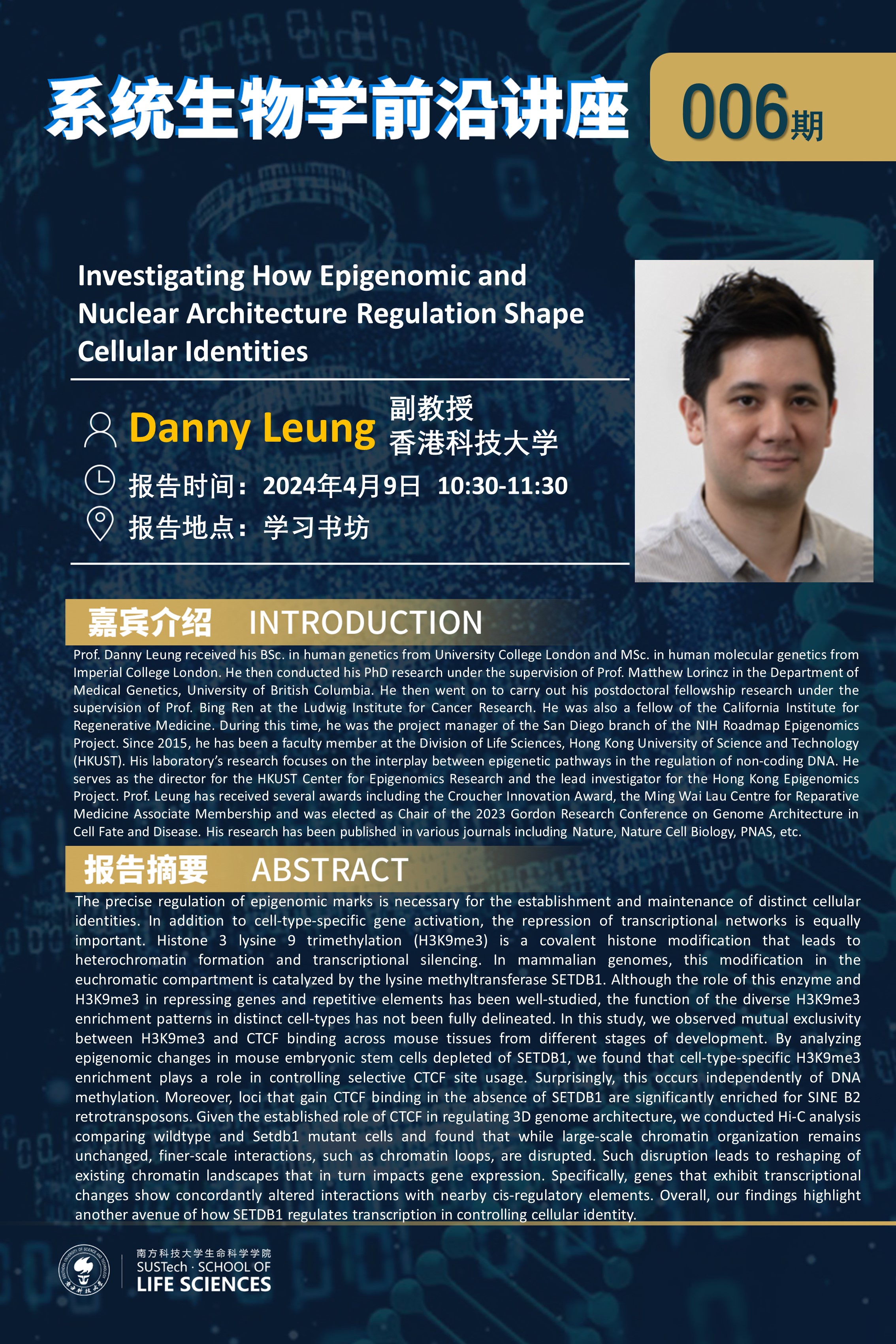
主讲人: Danny Leung 副教授(香港科技大学)
时间: 2024年4月9日(周二)上午10:30-11:30
地点: 学习书坊
题 目:Investigating How Epigenomic and Nuclear Architecture Regulation Shape Cellular Identities
主 讲:Danny Leung 副教授
时 间:2024年4月9日(周二)上午10:30-11:30
地 点:学习书坊
报告摘要:
The precise regulation of epigenomic marks is necessary for the establishment and maintenance of distinct cellular identities. In addition to cell-type-specific gene activation, the repression of transcriptional networks is equally important. Histone 3 lysine 9 trimethylation (H3K9me3) is a covalent histone modification that leads to heterochromatin formation and transcriptional silencing. In mammalian genomes, this modification in the euchromatic compartment is catalyzed by the lysine methyltransferase SETDB1. Although the role of this enzyme and H3K9me3 in repressing genes and repetitive elements has been well-studied, the function of the diverse H3K9me3 enrichment patterns in distinct cell-types has not been fully delineated. In this study, we observed mutual exclusivity between H3K9me3 and CTCF binding across mouse tissues from different stages of development. By analyzing epigenomic changes in mouse embryonic stem cells depleted of SETDB1, we found that cell-type-specific H3K9me3 enrichment plays a role in controlling selective CTCF site usage. Surprisingly, this occurs independently of DNA methylation. Moreover, loci that gain CTCF binding in the absence of SETDB1 are significantly enriched for SINE B2 retrotransposons. Given the established role of CTCF in regulating 3D genome architecture, we conducted Hi-C analysis comparing wildtype and Setdb1 mutant cells and found that while large-scale chromatin organization remains unchanged, finer-scale interactions, such as chromatin loops, are disrupted. Such disruption leads to reshaping of existing chromatin landscapes that in turn impacts gene expression. Specifically, genes that exhibit transcriptional changes show concordantly altered interactions with nearby cis-regulatory elements. Overall, our findings highlight another avenue of how SETDB1 regulates transcription in controlling cellular identity.
个人简介:
Prof. Danny Leung received his BSc. in human genetics from University College London and MSc. in human molecular genetics from Imperial College London. He then conducted his PhD research under the supervision of Prof. Matthew Lorincz in the Department of Medical Genetics, University of British Columbia. He then went on to carry out his postdoctoral fellowship research under the supervision of Prof. Bing Ren at the Ludwig Institute for Cancer Research. He was also a fellow of the California Institute for Regenerative Medicine. During this time, he was the project manager of the San Diego branch of the NIH Roadmap Epigenomics Project. Since 2015, he has been a faculty member at the Division of Life Sciences, Hong Kong University of Science and Technology (HKUST). His laboratory’s research focuses on the interplay between epigenetic pathways in the regulation of non-coding DNA. He serves as the director for the HKUST Center for Epigenomics Research and the lead investigator for the Hong Kong Epigenomics Project. Prof. Leung has received several awards including the Croucher Innovation Award, the Ming Wai Lau Centre for Reparative Medicine Associate Membership and was elected as Chair of the 2023 Gordon Research Conference on Genome Architecture in Cell Fate and Disease. His research has been published in various journals including Nature, Nature Cell Biology, PNAS, etc.